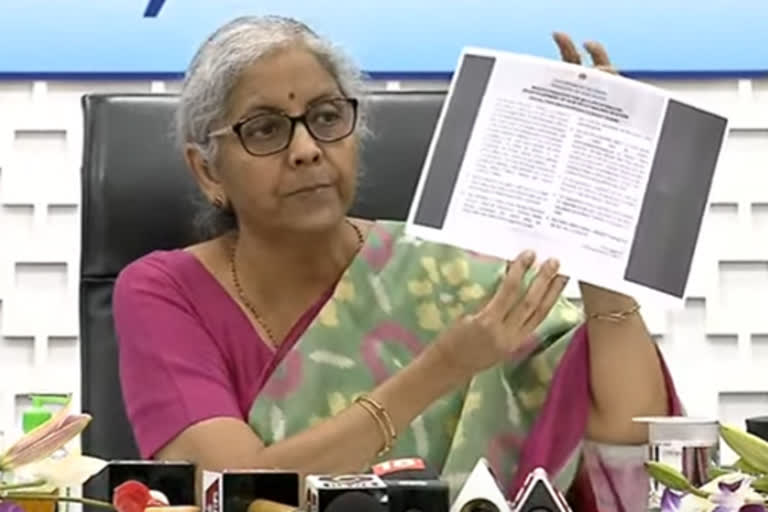Mumbai: Finance Minister Nirmala Sitharaman on Wednesday blasted Congress leader Rahul Gandhi for calling the National Monetisation Plan a sell off that aims to generate Rs 6 lakh crore for the government by commercial exploitation of surplus land and other assets available with the Central government.
“I wish the opposition questions with some homework done,” Sitharaman told reporters in Mumbai in response to a question about Rahul Gandhi’s accusation that the National Monetisation Pipeline amounted to a sell-off of public property.
Sitharaman criticised the Congress leader for not opposing the monetisation of Mumbai-Pune Highway and issue of Request for Proposal (RFP) for New Delhi Railway station during UPA government.
“Who actually monetised the Mumbai-Pune corridor? Was it not the Congress party? Who was then headed, and even now, headed by Sonia Gandhi. Rs 8,000 crore were raised from that,” Sitharaman said.
Recalling the tearing of an ordinance by Rahul Gandhi in September 2013 when Prime Minister Manmohan Singh was abroad, Nirmala Sitharaman questioned him as to why he did not tear apart the RFP for monetisation of New Delhi Railway Station that was issued in October 2008 during Prime Minister Manmohan Singh’s first tenure.
“New Delhi Railway Station, who called for RFP on it? Was it not the Congress party? RFP was issued for New Delhi Railway Station on 17.10.2008. Who was the Prime Minister then, who was the finance minister then? I would definitely ask Shri Rahul Gandhi, even when the Prime Minister was abroad, he thought that one of the ordinances was so outrageous that he tore it up in front of the media,” Sitharaman said.
“If he indeed is against monetisation then why the RFP for modernizing the New Delhi Railway Station was not torn to pieces by Shri Rahul Gandhi?” asked the finance minister.
The finance minister said she was willing to share more examples of the monetisation that took place during the Congress period if it amounted to a sale of government assets.
Kickbacks paid during UPA’s monetisation: FM
Sitharaman, who has often led the government’s charge against Congress leader Rahul Gandhi’s accusations, alleged that kickbacks were paid during the monetisation of government assets during the previous UPA governments.
“So the Congress party is every now and then coming up with: Oh they are selling the country. This is something they are very good at. They sold air, they sold water, they sold lands, they sold mines, and made a lot of kickback with it,” alleged the finance minister.
Also Read: Smriti Irani tears into congress's allegations on 'monetisation' proposal
In her counter to Rahul Gandhi’s accusation of NDA government selling the national assets, Sitharaman said Congress governments indulged in wrongdoing in the organisation of 2010 Commonwealth Games when Manmohan Singh was Prime Minister and Sheila Dixit was Chief Minister of Delhi.
“They (Congress party) charge the government: Oh you have been selling everything that has been built over the 70 years. 70 years over they built and what happened during Commonwealth games?” she asked.
“Within one Commonwealth Games they finished what all could be creamed out into the accounts of their cronies. That is their business, not that of the government of Prime Minister Modi's,” said the finance minister.
Monetisation will not change ownership: FM
Sitharaman also rejected the apprehensions of a sale of government assets under the monetisation plan, saying it does not mean the change of ownership that lies with the Central government.
“There is no change in the ownership under the monetisation pipeline. The ownership will still be with the Government of India. There will be a strict handing back,” explained the minister.
The finance minister had unveiled the National Monetisation Pipeline on Monday, which aims to generate Rs 6 lakh crore over the next three years by commercially exploiting the assets and lands available with the central government.
In a statement, the government had highlighted three distinct features of the Rs 6 lakh crore national monetisation pipeline.
The government said it was monetisation of rights and not the ownership and the assets will be handed back to the government at the end of the transaction period.
Second, these were brown-field de-risked assets, which would generate stable revenue streams. Third, a structured partnership with private entities will be under a well defined contractual framework with strict KPIs and performance standards.
“They are brown-field assets, they are almost completed but they are under-utilised. If the government were to utilise them better, it has to be put through the monetisation process where it will be put to more effective use, spruce it up or to bring it up to the level of utilisation,” explained the finance minister.
Also Read: Legalised loot, organised plunder: Congress on National Monetisation Pipeline



